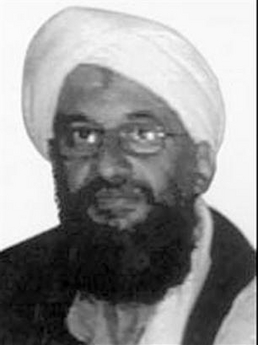|
Experts: 'Decapitation' may not end terror
(AP)
Updated: 2006-01-22 09:05
The Israeli assassins caught Abu Jihad in his study. They left the chief
strategist of the Palestinian uprising with 170 bullets in his body. Over the
next two decades, however, the movement only grew stronger, and Israel bled even
more.
It's called "decapitation," and a missile strike in Pakistan has raised the
question anew: Would eliminating Osama bin Laden and deputy Ayman al-Zawahri
deal a mortal blow to the al-Qaida terror network?
|

This is an undated handout
picture of Ayman al-Zawahri, said to be the right hand man of al-Qaida
terrorist leader Osama bin Laden. [AP file
photo]
| "Decapitation just fuels the movement
itself," says Jenna Jordan, a University of Chicago scholar who has closely
studied the historical record of such antiterrorist tactics.
"I think that is the lesson of the Israeli efforts over the years," says
Brian Jenkins, veteran terrorism analyst with the RAND Corp. research firm.
But, he quickly adds, "that doesn't mean you don't do it."
The Jan. 13 missile strike on a remote Pakistani border village showed again
that the U.S. government is still trying to do it.
The early-morning attack, reportedly aimed at al-Zawahri, killed 13 villagers
and possibly a few second-rank al-Qaida operatives — but not the bin Laden
lieutenant. Its immediate impact could be seen in the streets of Pakistani
cities, where thousands rallied, chanting "Death to America," in support of
al-Qaida's "jihad," or holy war.
By Thursday, bin Laden's voice was being broadcast throughout the Muslim
world, threatening a new terror strike against America.
"The Pakistan case, where you have all those people killed, that's the kind
of `bad press' that keeps a movement going," said Jordan, whose 2004 study
reviewed 72 international cases, stretching back almost a century, in which
militant movements' leaders were targeted and killed.
In most cases, she found, the movements carried on — particularly if they
were religion-based, like al-Qaida. Only one in five violent religious groups
collapsed when their leaders were eliminated, she determined.
"Sometimes it works and sometimes it doesn't," said Richard A. Clarke, who
was White House counterterrorism coordinator in 1998, when U.S. missiles were
fired at suspected al-Qaida training camps in Afghanistan in a failed effort to
kill its leaders.
"There's no iron law," Clarke told The Associated Press. "But the law
enforcement side, the intelligence side, will always want to eliminate the
leadership."
One of the most spectacular "eliminations" occurred in 1988, when Israeli
commandos slipped into Tunisia and stormed the exile home of the Palestine
Liberation Organization's Khalil al-Wazir, known as Abu Jihad, the PLO's No. 2
and architect of the uprising that had exploded five months earlier in
Israeli-occupied territories.
Abu Jihad was killed, but the "intefadeh" went on, and by the 1990s still
more Palestinian groups had joined in, followed by still more decapitations.
With the latest tracking technologies, the Israelis have successfully targeted
top leaders of the Hamas group in particular.
Some analysts believe this has contributed to a decline in suicide terror
bombings since 2003. But the Islamic militant group's following has grown and
bombings continue. After two successive Hamas chiefs were killed in 2004, the
group vowed "100 reprisals."
"Usually these assassinated leaders are from the public, political wing, but
there are many underground military commanders far from Israel's hands," said
Islamist researcher Yasser al-Sirri, of London's Islamic Observation Center.
Jenkins noted that diversity in the Palestinian movement makes decapitation
difficult. "When you're dealing with a disparate host of terrorist foes over
time, as the Israelis have confronted, then it has less effect."
Examples of recent decapitations cited by Jordan and others:
? Shining Path, the Maoist insurgency that rocked Peru in the 1980s, has all
but collapsed since the capture of founder Abimael Guzman in 1992. Such
ideologically based movements are most affected when their leaders are removed,
Jordan found.
? Turkey's Kurdish separatist group PKK declared a unilateral cease-fire in
1999 after leader Abdullah Ocalan was captured, but renounced it in 2004. Its
attacks have increased in recent months.
? The entire leadership of Spain's Basque separatist group ETA was arrested
in 1992, but ETA bombings and assassinations soon resumed. Territorially based
nationalist groups like the Kurds and Basques tend to be resilient, Jordan
observed.
When it comes to al-Qaida, which organized the Sept. 11, 2001, U.S. terror
attacks, analysts underscore an important emerging characteristic of the group:
It seems to be growing more diffuse and decentralized, as seen in the unending
campaign of Iraq suicide bombings carried out in its name.
"Al-Qaida is not one group anymore, but rather an idea," al-Sirri said. "The
jihad is not about individuals. If bin Laden is killed or captured, tens of new
bin Ladens will be born."
|